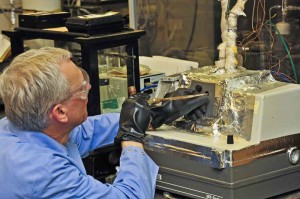 The key to the evaluation of potential treatment technologies on a waste or waste stream is a study of the selected alternative technique(s) on a bench or laboratory scale. The data from this study are critical in decision making, such as the future potential of the technique, effective range of application, secondary waste production, demonstration of safe utilization, scale-up criteria for field application and whether at full-scale the regulatory treatability requirements will be met.
The key to the evaluation of potential treatment technologies on a waste or waste stream is a study of the selected alternative technique(s) on a bench or laboratory scale. The data from this study are critical in decision making, such as the future potential of the technique, effective range of application, secondary waste production, demonstration of safe utilization, scale-up criteria for field application and whether at full-scale the regulatory treatability requirements will be met.
MCLinc as a former DOE National Environmental User Facility has extensive experience in designing and implementing laboratory scale treatability studies on a variety of waste types. These have included gas streams, waste acids, contaminated groundwater, process waters, mixed waste sludge, soils and reactive solids. The treatability process may involve simple “jar tests”, or column tests on up to complex systems engineered to duplicate full-scale applications.
MCLinc scientists are skilled in the application of techniques, which enable the collection of sufficient data in a timely cost effective manner. For example, our project chemists have used non-radioactive surrogates to study the treatment of hazardous materials in highly radioactive wastes; used chemical indicators rather than full chemical characterization; or radiological tracers to track movement of materials during treatment.
The treatability evaluation incorporates MCLinc’s staff knowledge of materials compatibility, chemical interactions, process optimization, waste management, off-gas characterization, data interpretation, failure analysis, and process health and safety evaluation.
MCLinc’s experience on treatability techniques ranges from classical approaches of precipitation, extraction, chemical, thermal and biological treatment, to evaluation of novel sorbents.
Examples of MCLinc experience include:
- Extraction of oil and grease from mixed waste sludge
- Extraction of mercury and uranium from mixed waste sludge for resource recovery.
- Stabilization of radionuclides in complex waste sludge
- Bench-scale testing of novel chemical processes including thermal treatment systems
- Demonstration and validation of innovative asbestos destruction processes
- Evaluations of Grout formulations on technetium and uranium contaminated mixed waste process sludge.
- Grout, polymer encapsulation, vitrification, and microwave sintering of radiological surrogates in simulated filter cake and sludge.
- Treatment of groundwater and process water contaminated with technetium, uranium, mercury and other heavy metal with zero-valent iron and novel sorbents including Apatite.
- Electro-osmosis for decontaminating concrete
MCLinc has not only the experienced professional staff involved in these studies, but also the secure facilities to handle many forms of hazardous and radiological materials safely. In addition, analytical chemistry instrumentation and methods are available to monitor the treatment systems on a real-time basis to allow on-the-spot operational changes.
